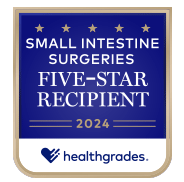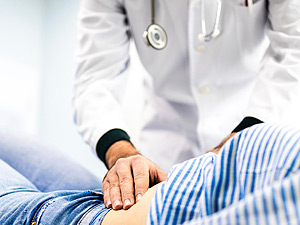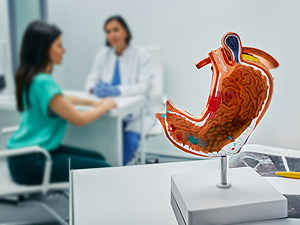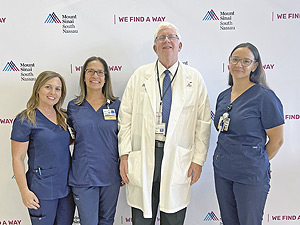Colon Cancer Screening
Colorectal Cancer Screening and Early Detection
Screening for colorectal cancer screening is strongly recommended for everyone, starting at age 45. That’s because screening can help detect growths (polyps) in your colon before they turn into cancer or catch cancer in its earliest stages. Colorectal cancer screening has been proven to save lives. If caught early, colorectal cancer has a 95% survival rate.
Colon cancer screening can detect polyps and early cancers in the large intestine. This type of screening can find problems that can be treated before cancer develops or spreads. Regular screenings may reduce the risk for death and complications caused by colorectal cancer.
Types of Colorectal Cancer Screenings
Stool test:
- Polyps in the colon and small cancers can cause small amounts of bleeding that cannot be seen with the naked eye. But blood can often be found in the stool.
- This method checks your stool for blood.
- A common test used is the fecal occult blood test (gFOBT). Two other tests are called the fecal immunochemical test (FIT) and stool DNA test (sDNA) commonly known as Cologuard.
Sigmoidoscopy:
- This test uses a small flexible scope to view the lower part of your colon. Because the test only looks at the last one third of the large intestine (colon), it may miss some cancers that are higher in the large intestine.
- Sigmoidoscopy and a stool test may be used together.
Colonoscopy:
- A colonoscopy is similar to a sigmoidoscopy, but the entire colon can be viewed.
- Your health care provider will give you the steps for cleansing your bowel. This is called bowel preparation.
- During a colonoscopy, you receive medicine to make you relaxed and sleepy.
- Sometimes, CT scans are used as an alternative to a regular colonoscopy. This is called a virtual colonoscopy.
Screening for Average-Risk People
There is not enough evidence to say that any one screening method is best. Colonoscopy is the most thorough but also has the highest risk. Talk to your provider about which test is right for you.
All adults should have a colon cancer screening test starting at age 45.
Screening options for people with an average risk for colon cancer:
- Colonoscopy every 10 years starting at age 45
- gFOBT or FIT every year (colonoscopy is needed if results are positive)
- sDNA-FIT every 1 to 3 years (colonoscopy is needed if results are positive)
- Flexible sigmoidoscopy every 5 years or every 10 years plus stool testing with FIT done every year
- CT colonography (virtual colonoscopy) every 5 years
Screening for Higher-Risk People
People with certain risk factors for colon cancer may need earlier (before age 45) or more frequent testing.
More common risk factors are:
- A family history of inherited colorectal cancer syndromes, such as familial adenomatous polyposis (FAP) or hereditary nonpolyposis colorectal cancer (HNPCC).
- A strong family history of colorectal cancer or polyps. This usually means close relatives (parent, sibling, or child) who developed these conditions younger than age 60.
- A personal history of colorectal cancer or polyps.
- A personal history of long-term (chronic) inflammatory bowel disease (for example, ulcerative colitis or Crohn disease).
Screening for these groups is more likely to be done using colonoscopy.

Miranda Steiger Shares Her Colorectal Cancer Journey from Screening and Diagnosis to Recovery
Miranda Steiger, Long Beach mother of three shares her journey from screening to diagnosis to treatment of colorectal cancer and urges everyone to get screened early. She credits Dr. Frank Caliendo, Director of Colorectal Cancer and the entire team at Mount Sinai South Nassau for providing her with the best care. Thank you, Miranda, for sharing your story and helping to bring awareness for this important cause. Please contact us at 516-992-5626 if you are looking to schedule a screening.
Learn More
Bariatric Endoscopy
Hepatology/Liver Diseases
Inflammatory Bowel Disease
General Gastroenterology
Motility Program
Colon Cancer Screening
Pancreas Cyst Clinic
Gastrointestinal (GI) Endoscopy Unit
Liver and Bile Duct Surgery Program
Pancreatic Surgery Program
Cancer Treatment & Oncology Care

Bariatric Endoscopy
Over 40% of adults across all ages and genders struggle with obesity....
Read More

Hepatology/Liver Diseases
At Mount Sinai South Nassau, our liver specialists or hepatologists have been at the forefront of groundbreaking...
Read More

Inflammatory Bowel Disease
Inflammatory bowel disease (IBD) is a recurring and long-term (chronic) condition that affects your digestive tract...
Read More

General Gastroenterology
We understand how much your digestive health impacts your quality of life...
Read More

Motility Program
The Mount Sinai South Nassau Gastrointestinal Motility Program is led by a team of gastroenterologists...
Read More

Colon Cancer Screening
Screening for colorectal cancer screening is strongly recommended for everyone, starting at age 45...
Read More

Pancreas Cyst Clinic
The Pancreas Clinic at Mount Sinai South Nassau offers extensive, specialized expertise in diagnosing...
Read More